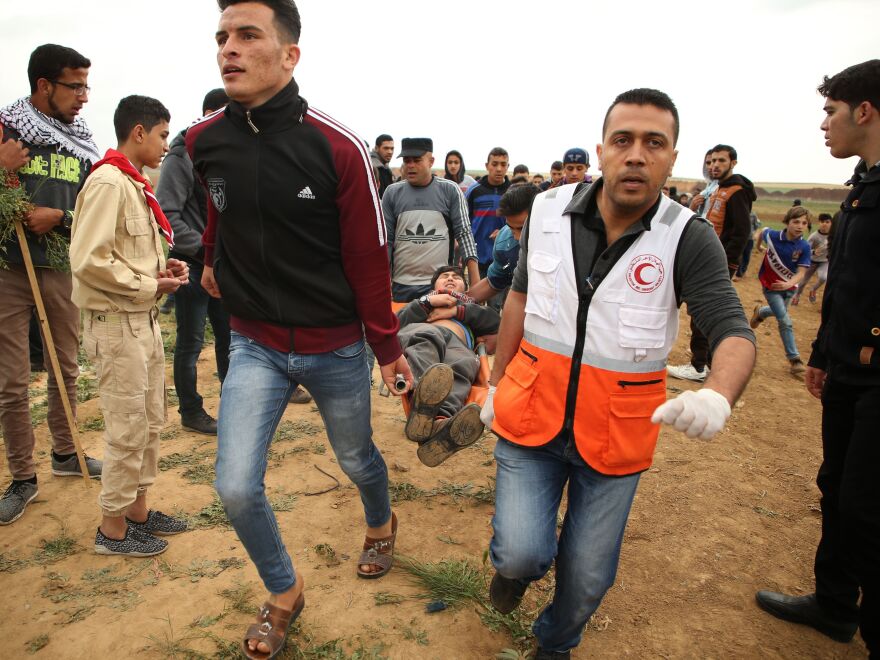Updated at 1:08 p.m. ET Saturday
At least 16 Palestinians have been killed and more than 1,000 injured in clashes Friday with Israeli troops along the Gaza border, according to the United Nations.
The victims range in age from 16 to 42 years old, according to Palestinian health officials. Palestinian health officials tell NPR that hundreds of Palestinians suffered from a range of injuries. The Associated Press reports the injuries were from live fire, rubber bullets or tear gas.
The U.N. Security Council called an emergency meeting to discuss the situation Friday night.
One of the dead recorded Friday was a man killed in the early morning before the demonstrations started. Israel says that he was approaching the border and that an Israeli tank fired on him. Palestinian health officials said Israel targeted farmers in the area. In Friday's demonstrations, Palestinians threw rocks and firebombs toward Israeli troops on the border.
The clashes come as Hamas, which controls Gaza, organized protests for the annual day when Palestinian refugees demand to return to areas in what is now Israel. Israel has been warning Palestinians to stay away from the border fence.
Tensions are high amid what are being called the "March of Return" protests, as Reuters reports:
"The protest marks 'Land Day,' an annual Palestinian commemoration of the deaths of six Arab citizens of Israel killed by Israeli security forces during demonstrations over government land confiscations in northern Israel in 1976.
"The demonstrators are demanding that Palestinian refugees be allowed the right of return to towns and villages which their families fled from, or were driven out of, when the state of Israel was created in 1948."

The protests are planned to last through mid-May, the 70th anniversary of the founding of Israel.
"The large crowds ... reflect the Palestinian people's determination to achieve the right of return and break the siege and no force can stop this right," said Hamas spokesman Fawzi Barhoum, according to AP.
The Israeli army tweeted that Palestinian protesters were "rolling burning tires and hurling firebombs & rocks at the security fence & IDF troops, who are responding w riot dispersal means and firing towards main instigators." It said it has reinforced troops and warned that it "is prepared to respond to the violent riots planned throughout the Gaza Strip, if necessary."
Update: 17,000 Palestinians are rioting in 5 locations along the Gaza Strip security fence. The rioters are rolling burning tires and hurling firebombs & rocks at the security fence & IDF troops, who are responding w riot dispersal means and firing towards main instigators
— Israel Defense Forces (@IDF) March 30, 2018
Israel Defense Minister Avigdor Liberman took the unusual step of tweeting in Arabic in a message to those living in Gaza. "Everyone approaching the wall endangers his life," he wrote. "I advise you to continue your normal lives and not engage in provocation."

Israel does not accept any right of return for Palestinian refugees.
"No Israeli government would ever be likely to accept this demand, since it would spell the end of Israel as a Jewish-majority state," The Times of Israel writes. "Israel's position is that Palestinian refugees and their descendants would become citizens of a Palestinian state at the culmination of the peace process, just as Jews who fled or were forced out of Middle Eastern countries by hostile governments became citizens of Israel."
One of the farmers killed was identified as 27-year-old Amr Samour, who died when an Israeli tank fired on him. Another man was injured by shrapnel in the shelling.
His relative and fellow farmer, Yasser Samour, told the AP that Amr Samour had been collecting parsley in the early morning darkness when he was struck.
"I was working on the next field," Samour told the AP. "We heard shelling landing on the field where Amr works. We ran there and found him hit directly with a shell. We were more than kilometer away from the border."
A spokesman for the Israeli military told Reuters that in southern Gaza, "two suspects approached the security fence and began operating suspiciously and the tank fired towards them."
The clashes are happening amid a number of holy days: Passover begins at sundown on Friday, which is also Good Friday for Christians; Easter for Western Christian churches is this Sunday; and Orthodox Easter is next Sunday.
Copyright 2021 NPR. To see more, visit https://www.npr.org. 9(MDAxODc1ODA5MDEyMjg1MDYxNTFiZTgwZg004))




